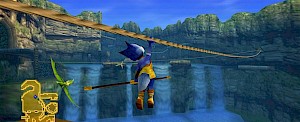News: D&D interview
Posted 19 Jun 2002 at 21:40 by Gerben
Question: When designing a D&D-type game, what are the most important elements that "must" be in the game?
Brenda: "There are a lot of them, actually. First and foremost, you need the classic D&D character classes, like the Fighter, Rogue, Cleric and Wizard we have in D&D Heroes, along with everything that goes into making them what they are, from their statistics and skills to their magical spells and feats. You need a believable, medieval world in which the characters exist, and you need a strong story. Lastly, you need lots and lots of monsters. Almost all of ours come from the 3rd Edition of D&D, and there are even some new creatures we hope players will soon see in future D&D books and modules. D&D has the best monsters, hands down. Throughout the development, we've been working really closely with Wizards of the Coast, and they've been really supportive of D&D Heroes."
Q: What aspects of this game do you think will set it apart from the plethora of other RPG titles hitting the market in the coming year?
Brenda: "The most obvious is that it's a four-player cooperative multiplayer game. It's not split screen, either, which is a question we were asked a lot at E3. You, the other players and as many monsters as you can handle all in one place. For overall fun factor, there's nothing as good as that.
"Another thing that sets D&D Heroes apart is that it provides an immediate and immersive D&D experience that's faithful to the series. Within two minutes of starting the game, sooner if you decide to blow by the intro, you'll be deep in the action. The combat style will set D&D Heroes apart from a lot of the games coming out. I know I've already said a lot about it, but it deserves that � it's really different, versatile and fun.
"Another thing that we've done is given each character one primary weapon, two in the case of the Rogue. Your characters are heroes. They wouldn't just pitch their weapons, toss them away like garbage. No, they'd work on them, upgrade them, polish them, and that's what they do in Heroes. Throughout the game, your character will constantly improve that weapon, by finding secret upgrades and runestones. A lot of RPGs have made a whole separate game of inventory juggling and carrying capacity management. I don't think that's a lot of fun, particularly in a game where we want to keep the focus on the action. When I get a new weapon, even in a hardcore RPG or in traditional D&D, the first thing I ask isn't 'Oh cool. What's it's name and what's it look like?' I ask 'What does it do?' Between the upgrades and the gems, we give you every possible combination in a single weapon. I think players will appreciate that. To me, it's a lot more realistic � a hero just wouldn't toss his sword away.
"That brings me to another point. Since the characters in the game are heroes, they start off a few levels up so you're not fighting rats and bats just to scrape up XP. Also, everything they do has a heroic feel to it. I think that's a pretty unique thing in games nowadays. You're not in the Kingdom of Baele to savage it. You're there to save it. That's not saying you can't smash things. There's plenty of that. Your missions, though, are noble. That carries throughout the story.
When you're playing, you can also return to earlier levels you've beaten to play through them again. The monsters there will be tuned and populated accordingly. That allows you to get an edge on leveling up and to discover secrets you missed along the way. Also, we have experience reflect the character's ability, which is far more realistic. I mean, that big spider might have been a challenge when you were level 5, but when you're level 20? He's a splat mark on the floor. The tougher the encounter for you, the more experience you'll get."
Q: Demographically speaking, to whom do you think this game will appeal?
Brenda: "Really, D&D Heroes appeals to everyone. I know that sounds broad, but I think it's realistic. It's fast paced, exciting and immersive, and gets the players right into the action. The D&D purist and the RPG fan will recognize a lot of things: the stats they're familiar with, D&D monsters, feats, spells and skills. On the other hand, if a player has never played an RPG before, he or she will still have a blast, particularly with four players. We've had a lot of experience with RPGs, and we were able to streamline many things that people found cumbersome or difficult about them. Tackling those elements has widened our appeal tremendously.
For the full interview, check out Gamezone.
Source: Gamezone.






















